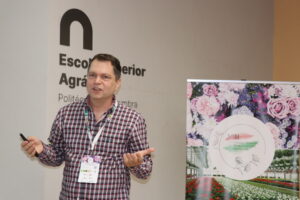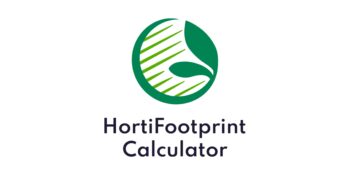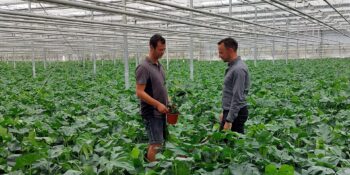At the “VIII Days for Ornamental Horticulture in Spain and Portugal” (VIII Jornadas Ibéricas de Horticultura Ornamental), which took place at the Agrarian School of Coimbra, Portugal, on 12-13 October, our Spain and Portugal coordinator René Rombouts spoke about the great positive results MPS-ABC participants have achieved over the past five years in lowering their environmental impact.
Green Deal: major challenge for the ornamental horticulture sector
As part of its Farm to Fork strategy, one of the central pillars of the European Green Deal, the European Commission has high ambitions for the sustainable use of crop protection agents. In concrete terms, it intends to reduce the use and risk of the most hazardous chemical crop protection agents in the EU by 50 percent by 2030. Monitoring product usage in MPS-ABC can be an important tool in the toolbox that growers will need to achieve this goal.
To measure is to know: finger constantly on the pulse
The principle of “to measure is to know” highlights the fact that to obtain an accurate analysis of data such as product usage, it is important to keep rigorous usage records. In Spain and Portugal, 160 growers of flowers, plants and other ornamental horticulture products are MPS-ABC certified. They record every application of crop protection agents and fertilisers in the record-keeping environment. Four times a year, this usage data is used to calculate a score which is fed back to the producers along with graphs and tables, to enable them to analyse and, if necessary, adjust their usage. Usage data is verified externally, leading to an assessment and a certificate, with MPS-A+ being the highest attainable qualification, followed by MPS-A, -B and -C. The assessment is communicated via the public MPS website and the Trade Portal, which has special functionalities for the trade. Purchasing organisations are increasingly prioritising sustainability criteria in their product procurement.
Significant drop in use of products
An analysis of the usage data of 85 Portuguese and Spanish growers who participated throughout the entire period between 2018 and 2022 reveals a significant drop in their usage per hectare. MPS operates in more than 50 countries and has noticed a general decline in product usage right across the spectrum.
There are various possible explanations for this drop:
- The principle of “to measure is to know”, as mentioned earlier: MPS provides growers with a quarterly qualification overview with detailed information on their usage data and a comparison with averages of other participants with similar crops and growing conditions. Participants enter their own data in the record-keeping environment, a system that has been constantly enhanced over the past 28 years.
- External communication of each producer’s score, ranging from MPS-A+, -A and -B to an MPS-C qualification. Many growers see a C qualification as falling short of their standards: if they are awarded a C qualification after their first audit, they will make every effort to achieve a higher score next time round.
- The widespread introduction of natural predators (beneficial organisms), particularly in protected cultivation, but also increasingly in outdoor settings. These efforts are leading to a decline in the use of broad-spectrum crop protection agents in particular, due to their incompatibility with the use of natural predators.
- The laws banning the use of certain products such as chlorpyrifos.
- Possibly also rising product costs, putting pressure on growers to use them more efficiently. Crop protection agents account for a substantial proportion of growers’ production costs.
 In his presentation in Portugal, René Rombouts concluded: “For various reasons it will be necessary to reduce usage of crop protection agents in the coming years, whether due to the Green Deal, the health risks or rising product costs. Reducing their use efficiently without compromising on product quality cannot be seen in isolation from detailed record keeping. MPS-ABC record keeping and certification offers growers effective tools for taking concrete steps in this regard.”
In his presentation in Portugal, René Rombouts concluded: “For various reasons it will be necessary to reduce usage of crop protection agents in the coming years, whether due to the Green Deal, the health risks or rising product costs. Reducing their use efficiently without compromising on product quality cannot be seen in isolation from detailed record keeping. MPS-ABC record keeping and certification offers growers effective tools for taking concrete steps in this regard.”



